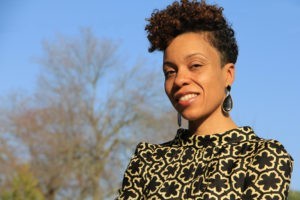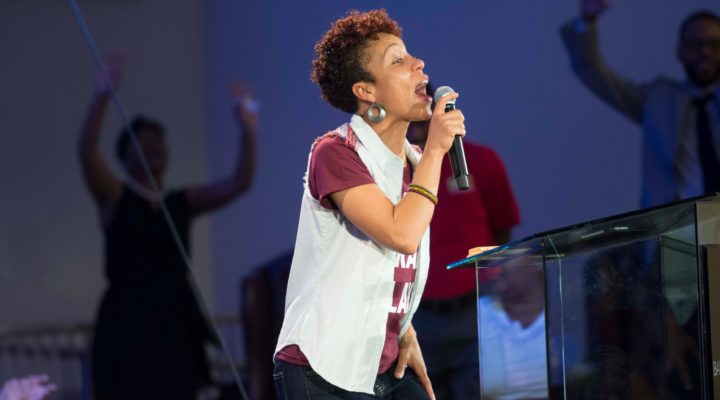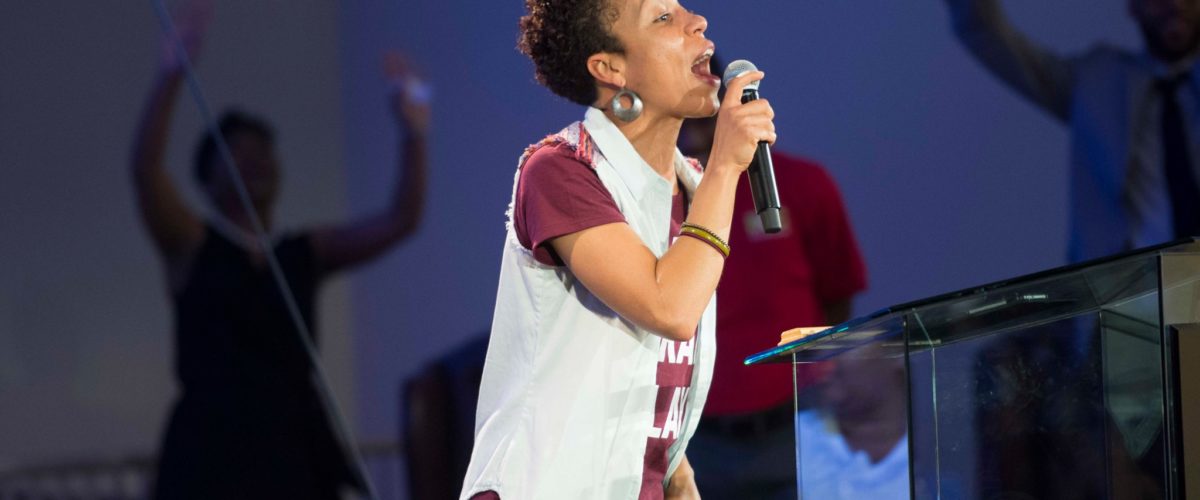Chalice Overy traveled quite a theological distance before arriving last year as associate pastor at Pullen Memorial Baptist Church in Raleigh, North Carolina.
The New Jersey native was raised in conservative fellowships before serving as a minister in similar congregations for several years.

Chalice Overy
Her spiritual upbringing could hardly be more night-and-day from Pullen, an Alliance of Baptists congregation with an historic and progressive social justice witness.
Even the concept of God differs greatly.
“In my early Christian life, I felt like I was walking a tightrope extended over the portals of hell, and that any misstep might seal my fate,” she said.
Such conceptions are long gone for Overy, whose ministry today is about continuing to explore the way grace plays out her own and others’ lives.
“This job affords me a lot of freedom to do things that would have gotten me fired before,” she said. “Now, I am exploring how God is calling me into that freedom.”
Overy spoke with Baptist News Global about her faith journey. Her comments are included here, edited for clarity.
Where did you grow up, geographically and religiously?
In northern and central New Jersey. My mom and I attended a United Methodist Church for some years. After my parents’ divorce I lived with my dad and my stepmother and I attended a pretty conservative non-denominational Bible church. I also went to their school. I learned a ton of Bible while I was there. At 13, I moved to Wilmington to be with my mom. She was a member of an AME (African Methodist Episcopal) church. That is where I stayed. I am still ordained in the AME church now.
When did you feel a calling to ministry?
At 17. The pastor of the AME church I was attending was a woman. That was good for me because that conservative church I had gone to before had indoctrinated me against women in ministry. They were clear that women weren’t to be in ministry or to be teaching any males over the age of 18. So, it was good for me to see my pastor walking in that calling, and I found myself attracted to ministry.
Were you shocked to learn that women could be pastors?
I heard it was happening. I had an argument against it from what I had been taught in that (Bible) church. But I had never seen it with my own eyes. Seeing it was a seamless transition. I never had any conflict with it.
How did you experience legalism during your prior ministry?
I did not experience it as much as I promoted it as an ethic. I was taught it somewhere, but I adopted it. I was very conservative as a woman in ministry.
How did that play out?
Not listening to so-called secular music. Not watching R-rated movies. Or being very judgmental in college of people going to parties. I was very much against homosexuality, or what we called the practice of homosexuality. I preached against it at that time.
You mention in your Pullen bio having used ‘apologetic gymnastics’ to defend such positions. Can you unpack that?
It was about doing whatever I needed to do to defend what I believed in the face of evidence to the contrary, either in science or lived experience. It was very irresponsible. I would use logic in a way that I would never use it in an academic sense. It feels like lying now that I look back on it. The fear was that if one thing in our beliefs was wrong, it was all in danger of falling apart.
When did you begin to sense a disconnect between those attitudes and life’s complexities?
The greatest transformation was during my first pastoral appointment. I was struggling emotionally and financially. I was sad. And that hadn’t been an experience I had before. I felt I had done all the things I could to discipline and will myself out of that way of feeling, so I concluded “God, you must hate me because you can do something about this and you won’t.”
At the same time my best friend was wrestling with her sexuality and she had also come from a very conservative church background. I never thought I’d meet someone more conservative than me, and she was. My advice to her in that situation switched from “you have to find a way to manage this or not to act on it” to “you have to find a way to live with this and to make peace within yourself.”
Is that where you began to feel the ‘robust economy of grace’ mentioned in your bio?
It came from wrestling around with these ideas of Providence and what kind of agency does God exert. I began to allow myself to consider these things instead of telling myself I had to believe what I had been told to believe. I had been able to extend this to my friend. I felt I didn’t have a choice in that. I wasn’t going to reject her. And if I wasn’t condemning her, I didn’t see how God could. I realized in my own life I couldn’t manage my own legalism, so I needed grace for myself so I could live without the constant fear of condemnation.
I realized then that I had a relationship with God that had become unhealthy because of the fear that not getting it right would send God’s wrath against me.
Could you be the minister you are today without those experiences?
I can’t imagine being here without any of it. I am very grateful to have arrived at this place. I am grateful for the evolution that allows me to continue this journey.
And, no, I would not be able to deeply engage scripture and my faith the way I do without becoming so familiar with scripture from my experience at that Bible church, or had I not become so regimented in my early devotional life. I can’t see getting to the one place without the other.


